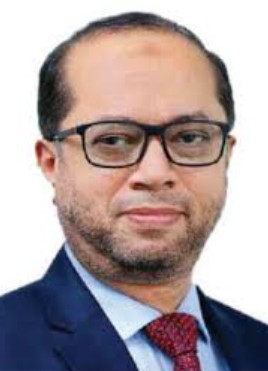Mohammed Monirul Moula, the former managing director (MD) of Islami Bank Bangladesh PLC, was arrested from his residence on Monday, following accusations of embezzling bank funds through loan irregularities.
Along with 57 others, including such as S Alam, Moula is facing charges in a case related to the alleged misappropriation of funds.
Moula, originally from Cox’s Bazar, holds a master’s degree in economics from the University of Chittagong. He joined Islami Bank in 1986, and his rise to the top executive position at the country’s largest private sector bank is a notable case.
His career trajectory is an anomaly in the industry, as he was not originally aligned with the influential S Alam family, which controlled several banks until last year’s political shift which ousted Sheikh Hasina and befell the Awami League government.
According to several former colleagues, Moula was a professional banker and never expected to lead the management team. However, his career took a turn when he was selected by the S Alam group in 2017, a move that many believe marked the beginning of his alignment with the controversial business group.
The S Alam group, which predominantly consists of individuals from the Chattogram region, took control of several banks, including Islami Bank. Following S Alam’s takeover of Islami Bank, Moula was promoted to additional managing director in February 2018 and positioned himself as a contender for the MD role.
One former banker, who once aspired to this position but was sidelined due to his commitment to ethics and professionalism, described the environment under Moula’s leadership.
“To succeed under S Alam, you had to abandon all your professional training. The only requirement was to serve S Alam’s interests without question,” he told Times of Bangladesh on Monday wishing to remain anonymous.
While the fund siphoning from Islami Bank remained relatively moderate until the pandemic, Moula was appointed managing director in 2021.
However, his leadership saw a dramatic decline in the bank’s financial health. He approved loans without proper due diligence, leading to a crisis of Non-Performing Loans (NPLs).
By the end of March this year, Islami Bank reported over 27 per cent of its loans as non-performing, amounting to more than Tk 47,000 crore. Market analysts believe the actual figures could be far worse.
In response to these revelations, the Anti-Corruption Commission (ACC) filed a case in late 2024 against Moula and 57 others, accusing them of embezzling Tk 1,092 crore through fraudulent loans.
Subsequently, the Board of Directors of Islami Bank removed Moula from his position due to his involvement in loan irregularities and the mismanagement uncovered by an external audit.
The decision was made during the 395th board meeting on 6 April 2025, and was later approved by Bangladesh Bank on May 20.
Earlier in April, Islami Bank had also placed Moula on a three-month leave.


